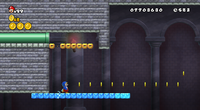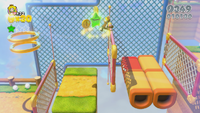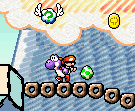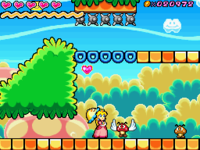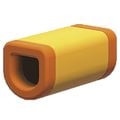Donut Block: Difference between revisions
Nintendo101 (talk | contribs) mNo edit summary |
Nintendo101 (talk | contribs) m (→References) |
||
| Line 200: | Line 200: | ||
}} | }} | ||
[[Category:Blocks]] | [[Category:Blocks]] | ||
[[Category:Hazardous objects]] | [[Category:Hazardous objects]] | ||
[[Category:Lifts]] | |||
[[Category:Captain Toad: Treasure Tracker objects]] | [[Category:Captain Toad: Treasure Tracker objects]] | ||
[[Category:Donkey Kong objects]] | [[Category:Donkey Kong objects]] | ||
Revision as of 13:44, December 28, 2024
- Not to be confused with doughnut block or falling block.
| Donut Block | |||
|---|---|---|---|
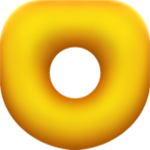 Artwork from Super Mario Maker for Nintendo 3DS (New Super Mario Bros. U style) | |||
| First appearance | Super Mario Bros. 3 (1988) | ||
| Latest appearance | Mario vs. Donkey Kong (Nintendo Switch) (2024) | ||
| |||
- “As tasty as they may sound, the Donut Blocks are not for eating. You can, however, jump on top of them for a bit before they collapse from your weight.”
- —Tips, Super Smash Bros. for Nintendo 3DS
Donut Blocks[1][2] (also known as Donut Lifts,[3] Falling Blocks,[4][5] or donut platforms[6]) are a kind of platform first appearing in Super Mario Bros. 3. They get their name from the fact that they are round (except for the top) with a hole in the middle. If the player stands on one for more than a second, it drops below. Due to this, the player should constantly jump when crossing Donut Blocks to prevent them from dropping.
History
Super Mario series
Super Mario Bros. 3
Donut Lifts debut in Super Mario Bros. 3. They shake when Mario stands on them and fall soon afterwards. They will not regenerate after falling. In Super Mario Advance 4: Super Mario Bros. 3, there are spiky variants only seen in Bowser's Last Stand.[7]
Super Mario 64 / Super Mario 64 DS

Falling Blocks appear in Super Mario 64 and its remake, Super Mario 64 DS. These platforms resemble their two-dimensional counterparts, but are shown to be rather long (whereas Super Mario RPG previously showed "three-dimensional" Donut Blocks to be more square-shaped than rectangular). In Rainbow Ride, most have to be jumped over during the magic carpet ride and some serve as bridges to other parts of the level. Unlike in Super Mario Bros. 3, Mario will have to distance himself from the Falling Block for them to regenerate.
New Super Mario Bros.
Donut Blocks reappear in New Super Mario Bros. In this game, they turn red before falling. Like in Super Mario Bros 3, once they fall, they never regenerate. The Mini form allows the player to traverse across Donut Blocks without affecting them.
New Super Mario Bros. Wii
Donut Blocks reappear in New Super Mario Bros. Wii. Unlike in the previous games, they now regenerate a few seconds after falling. There are also yellow ledges with grooves on their ends. When Mario walks over or hangs on them, they behave the same as Donut Blocks, turning red for a second before falling down. This variety appears only in World 4-2. Donut Blocks also appear during the boss battle in World 5-Castle.
Super Mario 3D Land
Donut Blocks reappear in Super Mario 3D Land. However, in this game, once landed on, they immediately fall down slowly and disappear below the stage, then reappear briefly afterwards. A rock variation exists, and it has the same effect.
New Super Mario Bros. 2
The Donut Blocks make an appearance in New Super Mario Bros. 2. Glacial versions of the Donut Blocks also appear in the snow world (World 4). These Donut Blocks are slippery and can be differentiated from the ordinary Donut Blocks by their light blue color. Other than being light blue and slippery, they share every characteristic of the normal Donut Blocks.
New Super Mario Bros. U
Donut Blocks also appear in New Super Mario Bros. U with the same functions as in the other games. Magikoopa also uses them in his battle by firing spells at the solid floor Mario can stand on. These Donut Blocks can be triggered by Mario in any form, even as Mini Mario. This same behavior reappears in New Super Luigi U and New Super Mario Bros. U Deluxe.
Super Mario 3D World / Super Mario 3D World + Bowser's Fury
Donut Blocks appear in Super Mario 3D World and its port with the same design and behavior from Super Mario 3D Land. They now turn red when stepped on, same as their appearance in the New Super Mario Bros. games.
Super Mario Maker / Super Mario Maker for Nintendo 3DS / Super Mario Maker 2
Donut Blocks reappear in Super Mario Maker, Super Mario Maker for Nintendo 3DS and Super Mario Maker 2, with the same functions as in the other games. In the Super Mario 3D World style, Donut Blocks are completely solid and cannot be jumped through, as well as taking on a more square appearance than the original game the style is based on. Thwomps can trigger Donut Blocks.
Additionally, as Donut Blocks are absent in Super Mario Bros. and Super Mario World, they have been given new sprites for those styles. Their Super Mario Bros. 3 sprites have been updated, sporting a lighter color scheme.
Super Mario Bros. Wonder
Donut Blocks return in Super Mario Bros. Wonder, with the same behavior as before. Wider versions with various widths also appear, all behaving the same as the standard block.
Yoshi's Island series
Super Mario World 2: Yoshi's Island and its remake Yoshi's Island: Super Mario Advance 3, as well as the sequels Yoshi's Island DS and Yoshi's New Island, also contained Donut Blocks. In Yoshi's New Island, a variation that is four times the normal size appears.
Super Mario RPG: Legend of the Seven Stars
Super Mario RPG: Legend of the Seven Stars additionally features them, accurately adapting their platforming concept into its isometric field gameplay.
Super Smash Bros. series
Donut Blocks are a recurring stage element in the Super Smash Bros. series. They first appear in Super Smash Bros. Melee, in the stage Rainbow Cruise, where Donut Blocks use their Super Mario 64 design, except they were made smaller in size compared to Mario. Unlike in both Super Mario Bros. 3 and Super Mario 64, Donut Blocks regenerate instantly after falling and breaking. In Super Smash Bros. Brawl, Donut Blocks retain their role in the Rainbow Cruise stage, and they have a similar counterpart named Drop Blocks that are used in Stage Builder and certain stages of The Subspace Emissary. Later on, Donut Blocks also appear in the 3D Land stage in Super Smash Bros. for Nintendo 3DS and Super Smash Bros. Ultimate, and they also appear in the downloadable Super Mario Maker stage.
Mario & Luigi series
In Mario & Luigi: Superstar Saga and Mario & Luigi: Superstar Saga + Bowser's Minions, a few Donut Blocks can be found in Guffawha Ruins. In Mario & Luigi: Bowser's Inside Story and Mario & Luigi: Bowser's Inside Story + Bowser Jr.'s Journey, Donut Blocks only appear in the Flab Zone, which are suspended over in the mucus. Luigi steps on these blocks, and they fall down into the mucus, causing him to fall into it as well, where he is rescued by Princess Lipid. Mario & Luigi: Dream Team, Donut Blocks appear in area B of Dreamy Neo Bowser Castle. They retain their colors from the New Super Mario Bros. games, but are much thinner, more stretched and rounder this time around. They function similarly to Super Mario 3D Land, where, once they are stepped on, they turn red and fall after a short time.
Mario vs. Donkey Kong series
Mario vs. Donkey Kong
Donut Blocks appear in Mario vs. Donkey Kong, functioning identically as in other Super Mario platformers.
Mario vs. Donkey Kong 2: March of the Minis
Donuts Blocks are also in Mario vs. Donkey Kong 2: March of the Minis, debuting in Magnet Mania. They do not turn red when a Mini walks over them, and regenerate shortly after falling. To keep a Mini on a Donut Block, the player must either stop the Mini or quickly and continuously move the Mini left and right. Donut Blocks allow a Mini to traverse Spikes and pits, as well as descend from heights that would destroy the Mini if it simply fell down.
Super Princess Peach
Donut Blocks reappear in Super Princess Peach, where they also have blue variants. If Peach stands on these blue Donut Blocks, they will fall immediately, so Peach needs to use her Gloom Vibe to quickly move across them.
Mario & Sonic at the Sochi 2014 Olympic Winter Games
Donut Blocks make a small appearance in Mario's Figure Skating Spectacular in Mario & Sonic at the Sochi 2014 Olympic Winter Games, where they retain their design and function from Super Mario 3D Land.
Captain Toad: Treasure Tracker
Donut Blocks appear in Captain Toad: Treasure Tracker and its Nintendo Switch and Nintendo 3DS ports, where they are identical to their appearance in Super Mario 3D World.
Yoshi's Woolly World / Poochy & Yoshi's Woolly World
In Yoshi's Woolly World and Poochy & Yoshi's Woolly World, Donut Blocks appear, retaining their function from the Yoshi's Island series. In this game, they appear to be made of sand, and disintegrate and fall when stepped on. Unlike previous installments, they do not turn red when falling.
The Super Mario Bros. Movie
Donut Blocks appear in a scene in The Super Mario Bros. Movie, where groups of them form parts of Princess Peach's Training Course, behaving the same way as they do in the games, turning red moments before falling.
Profiles
Super Mario Bros. 3
- 3DS Virtual Console Manual Bio: "More of a drop than a lift. When you step on this, it will shake and drop."
Gallery
- For this subject's image gallery, see Gallery:Donut Block.
Names in other languages
| Language | Name | Meaning | Notes |
|---|---|---|---|
| Japanese | ちくわブロック[8][9] Chikuwa Burokku |
Chikuwa Block | |
| チクワリフト[10][11][12] Chikuwa Rifuto |
Chikuwa Lift | Super Mario Bros. 3, Super Mario World 2: Yoshi's Island | |
| ちくわ床[13] Chikuwa Yuka |
Chikuwa Floor | Super Mario 64 | |
| ちくわ Chikuwa Yuka |
Yoshi's Island DS | ||
| Chinese (simplified) | 竹轮砖块[20] Zhúlún Zhuānkuài |
Chikuwa Block | |
| 甜圈平台[?] Tiánquān Píngtái |
Donut Platform | Yoshi's Island: Super Mario Advance 3 | |
| Chinese (traditional) | 竹輪磚塊[?] Zhúlún Zhuānkuài |
Chikuwa Block | |
| Dutch | Donutblok[?] | Donut Block | |
| French (NOA) | Bloc beigne[?] | Donut Block | |
| French (NOE) | Ascenseur donut[?] | Donut Lift | |
| Ascenseur beignet[?] | |||
| Bloc beignet[?] | Donut Block | ||
| German | Donut-Block[?] | Donut Block | |
| Italian | Ascensore a ciambella[16] | Donut-shaped lift | Super Mario Bros. 3 |
| Piattaforma ciambella[17] | Donut platform | Super Mario Bros. 3 (3DS e-manual) | |
| Blocco ciambella[18] | Donut block | Since New Super Mario Bros. U | |
| Blocco Ciambella[19] | Donut Block | Super Mario Bros. Encyclopedia | |
| Korean | 도넛블록[?] Doneot Beullok |
Donut Block | |
| Portuguese | Bloco de Donut[?] | Donut Block | |
| Russian | Блок-бублик[?] Blok-bublik |
Bagel Block | |
| Spanish | Bloque Rosquilla[?] | Doughnut Block | |
| Plataforma Hundible[15] | Sinkable Platform |
References
- ^ 1996. Super Mario RPG: Legend of the Seven Stars instruction booklet. Nintendo of America (American English). Page 17.
- ^ Stratton, Steve (November 18, 2012). New Super Mario Bros. U PRIMA Official Game Guide. Prima Games (American English). ISBN 978-0-307-89690-2. Page 27.
- ^ 1990. Super Mario Bros. 3 instruction booklet. Nintendo of America (American English). Page 19.
- ^ Pelland, Scott and Dan Owsen (1996). Super Mario 64 Player's Guide. Nintendo of America (American English). Page 120 and 122.
- ^ Stratton, Steve (November 18, 2012). New Super Mario Bros. U PRIMA Official Game Guide. Prima Games (American English). ISBN 978-0-307-89690-2. Page 127.
- ^ "These donut platforms will fall down if you stand on them for too long. So don't loiter on them for too long." – Message block in Donuts and Eggs. Yoshi's Island DS.
- ^ February 11, 2008. SMA4, World e-27 (Hidden Koopa Castle) [かくしクッパじょう]. YouTube (Japanese). Retrieved June 5, 2024.
- ^ 1996. Super Mario RPG instruction booklet. Nintendo (Japanese). Page 17.
- ^ Sakai, Kazuya (Ambit), kikai, Akinori Sao, Junko Fukuda, Kunio Takayama, and Ko Nakahara (Shogakukan), editors (2015). 『スーパーマリオブラザーズ百科: 任天堂公式ガイドブック』. Tokyo: Shogakukan (Japanese). ISBN 978-4-09-106569-8. Page 118, 150, 185, 200, 216, 233.
- ^ 1988. スーパーマリオブラザーズ3 (Sūpā Mario Burazāzu Surī) instruction booklet. Nintendo (Japanese). Page 17.
- ^ ---- (2015). "Super Mario Bros. 3" in『スーパーマリオブラザーズ百科: 任天堂公式ガイドブック』. Tokyo: Shogakukan (Japanese). ISBN 978-4-09-106569-8. Page 41.
- ^ Super Mario World 2: Yoshi's Island: From Japanese to English. The Mushroom Kingdom (English). Retrieved June 5, 2024.
- ^ ---- (2015). "Super Mario 64" in『スーパーマリオブラザーズ百科: 任天堂公式ガイドブック』. Tokyo: Shogakukan (Japanese). ISBN 978-4-09-106569-8. Page 92.
- ^ Yoshi's Island DS Nintendo Dream Book. Page 11.
- ^ Official Mario vs. Donkey Kong website. Guías Nintendo (European Spanish). Retrieved June 5, 2024.
- ^ Super Mario Bros. 3, Italian booklet. Page 19.
- ^ Super Mario Bros. 3 (3DS - Virtual Console) Italian e-manual. Page 15.
- ^ Canale New Super Mario Bros. U (February 13, 2013). New Super Mario Bros. U - Sfide: Pian pianino (Wii U). YouTube (Italian).
- ^ November 15, 2018. Super Mario Bros. Enciclopedia. Magazzini Salani (Italian). ISBN 889367436X. Page 41.
- ^ 超级马力欧 3D乐园:视频. iQue (Simplified Chinese). Retrieved June 5, 2024.
- Blocks
- Hazardous objects
- Lifts
- Captain Toad: Treasure Tracker objects
- Donkey Kong objects
- Mario & Luigi: Superstar Saga objects
- Mario & Luigi: Bowser's Inside Story objects
- Mario & Luigi: Dream Team objects
- Mario & Sonic at the Sochi 2014 Olympic Winter Games
- Mario vs. Donkey Kong objects
- Mario vs. Donkey Kong 2: March of the Minis
- New Super Mario Bros. objects
- New Super Mario Bros. 2 objects
- New Super Mario Bros. U objects
- New Super Mario Bros. Wii objects
- Super Mario 3D Land objects
- Super Mario 64 objects
- Super Mario 64 DS objects
- Super Mario Advance 4: Super Mario Bros. 3 objects
- Super Mario Bros. 3 objects
- Super Mario Maker objects
- Super Mario Maker 2 objects
- Super Mario RPG: Legend of the Seven Stars objects
- Super Mario World 2: Yoshi's Island objects
- Super Princess Peach objects
- The Super Mario Bros. Movie objects
- Super Mario Bros. Wonder objects
- Yoshi's Island DS objects
- Yoshi's Island: Super Mario Advance 3
- Yoshi's New Island objects
- Yoshi's Woolly World objects
